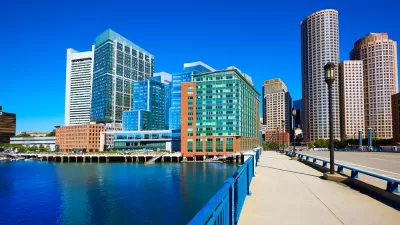Citing a "near-term risk" of rising tides, city planners in Boston are grappling with how to prepare residents and businesses for the effects of climate change, reports Monica Brady-Myerov.
With sea levels around Boston expected to rise anywhere between 2 to 6 feet by the end of the century, and storm surge models showing parts of the city could find themselves under 10 feet of water multiple times a year by 2050, the city is planning for how to deal with what officials consider a "near-term risk."
Although the city has a comprehensive climate action plan in place, residents like Magdalena Ayed, who lives in publicly-funded housing along the waterfront, "wishes city officials would talk to Boston residents about rising sea
level and provide guidance on what local residents should do in
response."
Some businesses, like the Boston-based healthcare group Partners for Healthcare, which is
building a new rehabilitation hospital in downtown Boston, are taking matters into their own hands. They've designed their hospital to sit more than 12 feet higher
than sea level, have located all patient rooms on upper floors, and placed the mechanical equipment on the roof.
FULL STORY: Boston Plans For 'Near-Term Risk' Of Rising Tides

Alabama: Trump Terminates Settlements for Black Communities Harmed By Raw Sewage
Trump deemed the landmark civil rights agreement “illegal DEI and environmental justice policy.”

Study: Maui’s Plan to Convert Vacation Rentals to Long-Term Housing Could Cause Nearly $1 Billion Economic Loss
The plan would reduce visitor accommodation by 25% resulting in 1,900 jobs lost.

Why Should We Subsidize Public Transportation?
Many public transit agencies face financial stress due to rising costs, declining fare revenue, and declining subsidies. Transit advocates must provide a strong business case for increasing public transit funding.

Wind Energy on the Rise Despite Federal Policy Reversal
The Trump administration is revoking federal support for renewable energy, but demand for new projects continues unabated.

Passengers Flock to Caltrain After Electrification
The new electric trains are running faster and more reliably, leading to strong ridership growth on the Bay Area rail system.

Texas Churches Rally Behind ‘Yes in God’s Back Yard’ Legislation
Religious leaders want the state to reduce zoning regulations to streamline leasing church-owned land to housing developers.
Urban Design for Planners 1: Software Tools
This six-course series explores essential urban design concepts using open source software and equips planners with the tools they need to participate fully in the urban design process.
Planning for Universal Design
Learn the tools for implementing Universal Design in planning regulations.
Caltrans
Smith Gee Studio
Institute for Housing and Urban Development Studies (IHS)
City of Grandview
Harvard GSD Executive Education
Toledo-Lucas County Plan Commissions
Salt Lake City
NYU Wagner Graduate School of Public Service




























